Learning & Teaching
Learning and Teaching encompasses the following areas: Student Outcomes, Curriculum, Assessment, Reporting, Principles and Pedagogy.
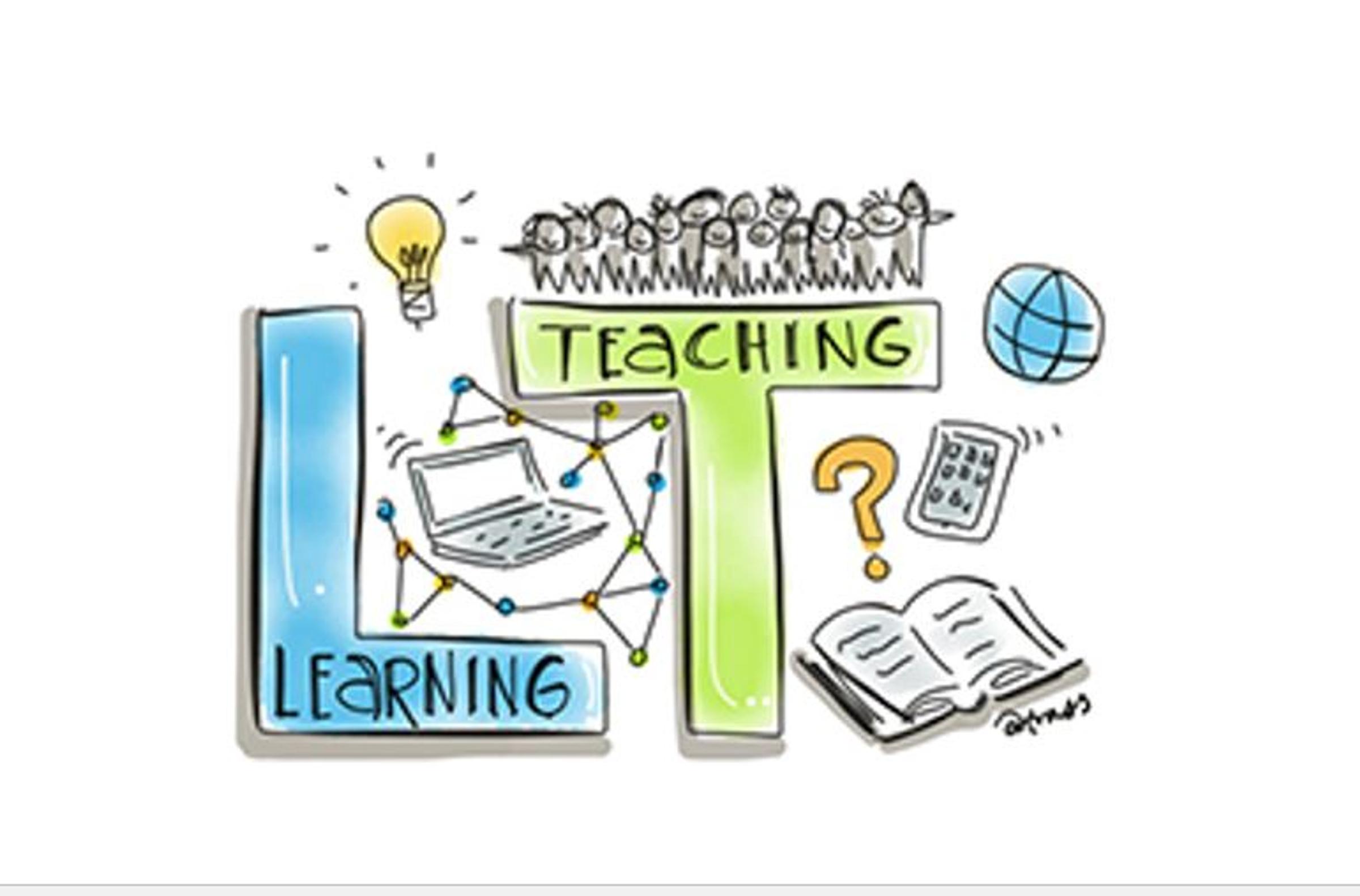
Learning & Teaching
Learning and Teaching encompasses the following areas: Student Outcomes, Curriculum, Assessment, Reporting, Principles and Pedagogy.
NAPLAN tests are designed to provide parents and schools with an understanding of how individual students are performing at the time of the tests. They measure the performance of students in literacy and numeracy against national standards.
It's important to remember that NAPLAN is not the only way to measure your child's abilities. It provides a snapshot of your child's performance in literacy and numeracy at a particular time. Your child's overall development, strengths, and areas for growth are reflected in their daily schoolwork, class participation, and other literacy and numeracy assessments.
NAPLAN is just one aspect of our school’s assessment and reporting process. It's not a replacement for teachers' ongoing assessments of student performance, but it does provide teachers with additional information about students’ educational progress. We believe in a collaborative approach to your child's education, and NAPLAN is a part of that.
The front page of the student report provides general information about the tests and explains how to read the report.
The second and third pages show the student’s results in each assessment area. The results are classified into one of four proficiency levels: exceeding, Strong, Developing, or needing additional support. The report shows the students’ achievement against the national average for their year (shown as a black triangle) and the range of achievement for the middle 60% of students in their year level (shown as a light-shaded rectangle).
The report's final page provides a brief summary of the skills typically demonstrated by students at each proficiency level. Longer descriptions of the skills usually shown by a student at each proficiency level can be found at the proficiency level descriptions.
The video below explains how to read your child’s report.
Reading the NAPLAN Individual Student Report
It's crucial to keep these NAPLAN results, as some secondary schools can request them during the enrolment process. This foresight will ensure you are well-prepared and proactive for your child's transition to secondary school.
If you have any questions about the enclosed information, please make an appointment with your child’s teacher or Vira Pirrotta. We are here to support you and provide any reassurance you may need.
NAPLAN results for Years 3 and 5 will be sent home this week.
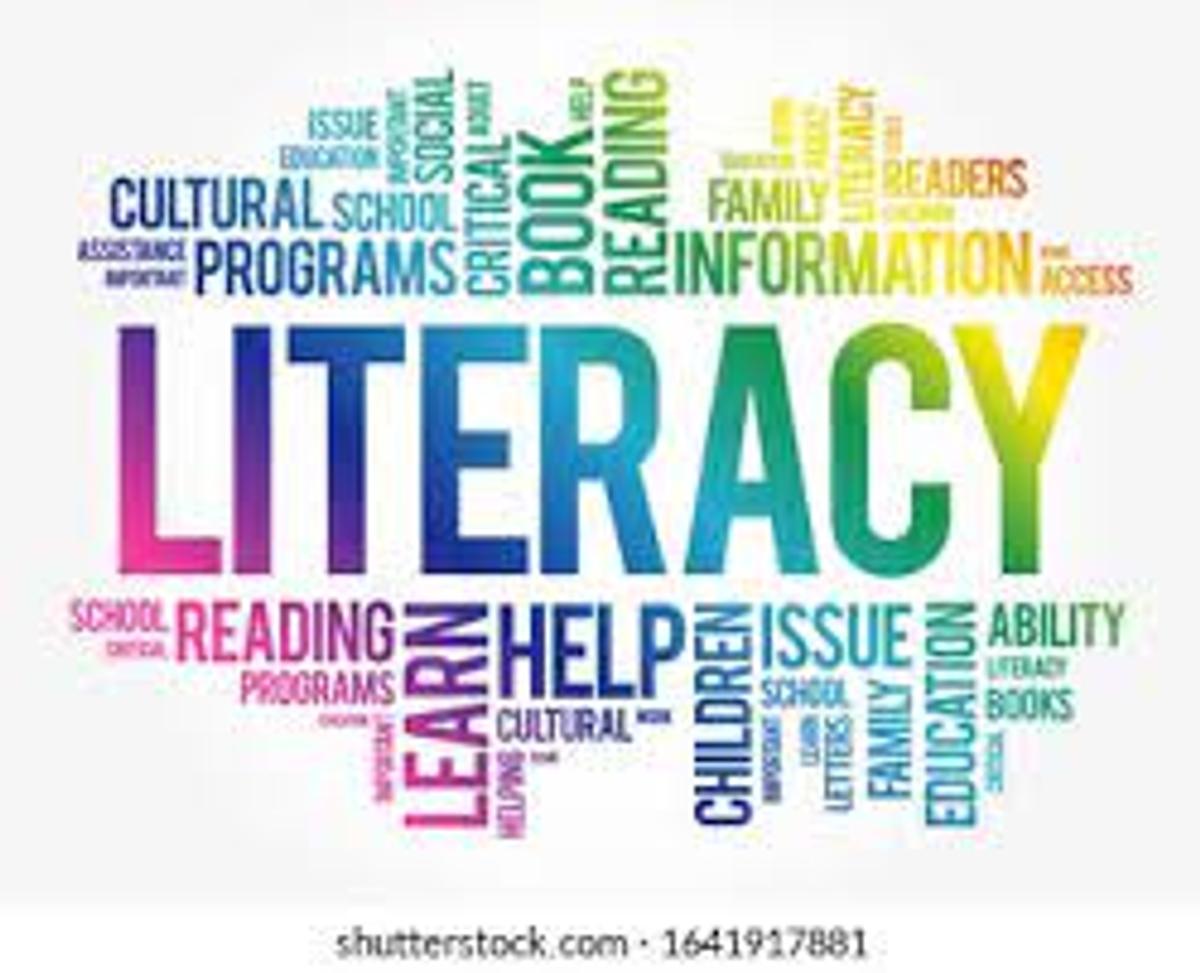

As we settle back into the school term, it’s important to establish consistent homework routines at home. Reading each afternoon or evening should be a priority for all students. Foundation to Year 2 students bring home readers that match their reading level, while students in Years 3 to 6 get to choose books they enjoy.
SMART Spelling is also an important part of homework at St Fidelis and should be completed each evening. Students are expected to study their spelling words and learn the spelling pattern of the week. At the end of the week, they are assessed through dictation to see if they can use the spelling pattern correctly in sentences.
Here’s a sneak peek at the novels our Years 3 to 6 students are enjoying and learning from this term:
Year 3 and 4 Novel Study
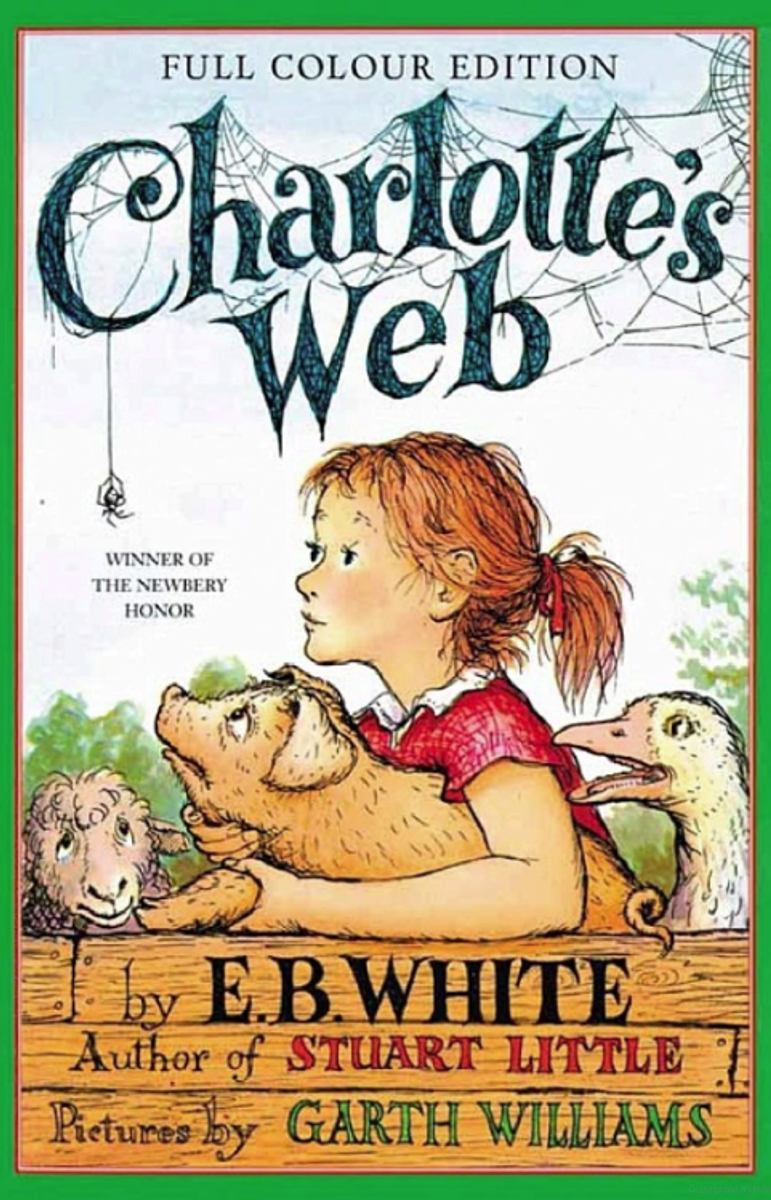

This term, Year 3 and 4 students are reading Charlotte’s Web by E.B. White. This is a classic story that has captured hearts for generations. It follows the friendship between Wilbur, a young pig who’s worried about his future, and Charlotte, a wise and caring spider who lives in the barn. When Charlotte begins weaving words into her web, she helps others see Wilbur in a different light. Her quiet determination and kind heart show just how powerful friendship and believing in others can be. Students are enjoying this thoughtful story that touches on themes like kindness, courage, and the importance of standing by those we care about.
Year 5 and 6 Novel Study
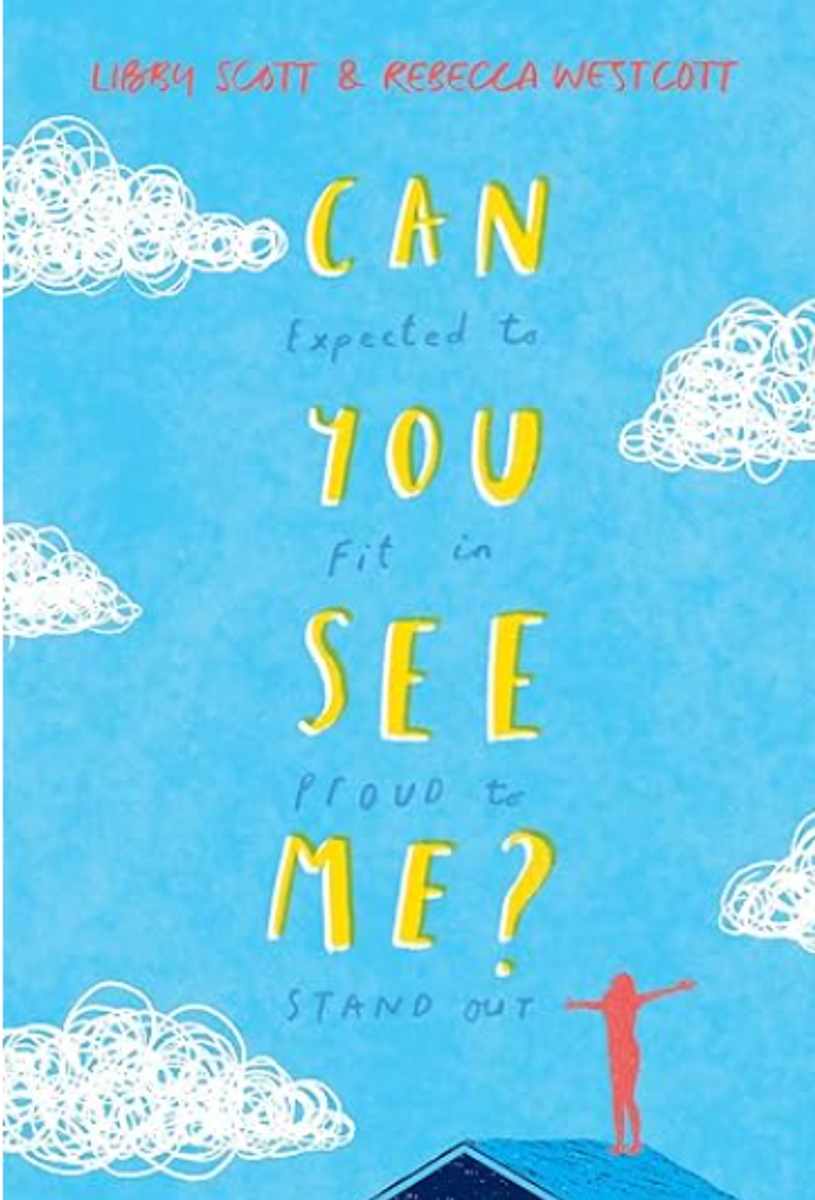

Students in Years 5 and 6 have begun reading Can You See Me?, a novel co-written by Libby Scott, a young author with autism, and Rebecca Westcott. The story is told through the voice of 11-year-old Tally, who is autistic, and shares her experiences at school, with friends, and at home. Through Tally’s diary entries and day to day life, students are gaining a deeper understanding of what it can feel like to be different in a world that often expects everyone to act the same. The book encourages empathy, celebrates individuality, and reminds readers how important it is to be kind and true to yourself.
Shortlisted Book Week titles
Next week, I’ll be sharing a brief history of the Children’s Book Council of Australia (CBCA), the organisation behind Book Week and the annual book awards that celebrate quality Australian children’s literature. I’ll also include a full list of this year’s shortlisted books. All students across the school will have the opportunity to read and study these books in more detail. Our Foundation to Year 2 students will explore the stories through a variety of engaging activities, while our Year 3 to 6 students will work together as a cohort to engage more deeply with the texts.
Scholastic Book Fair
The Book Fair is also a great opportunity to connect with your child over their interests and spark conversations about reading. Every book sold helps support our school, with proceeds going towards new resources for our library and classrooms.


Upcoming event: SMART Spelling Information Session
Book Week 2025: Book an Adventure.
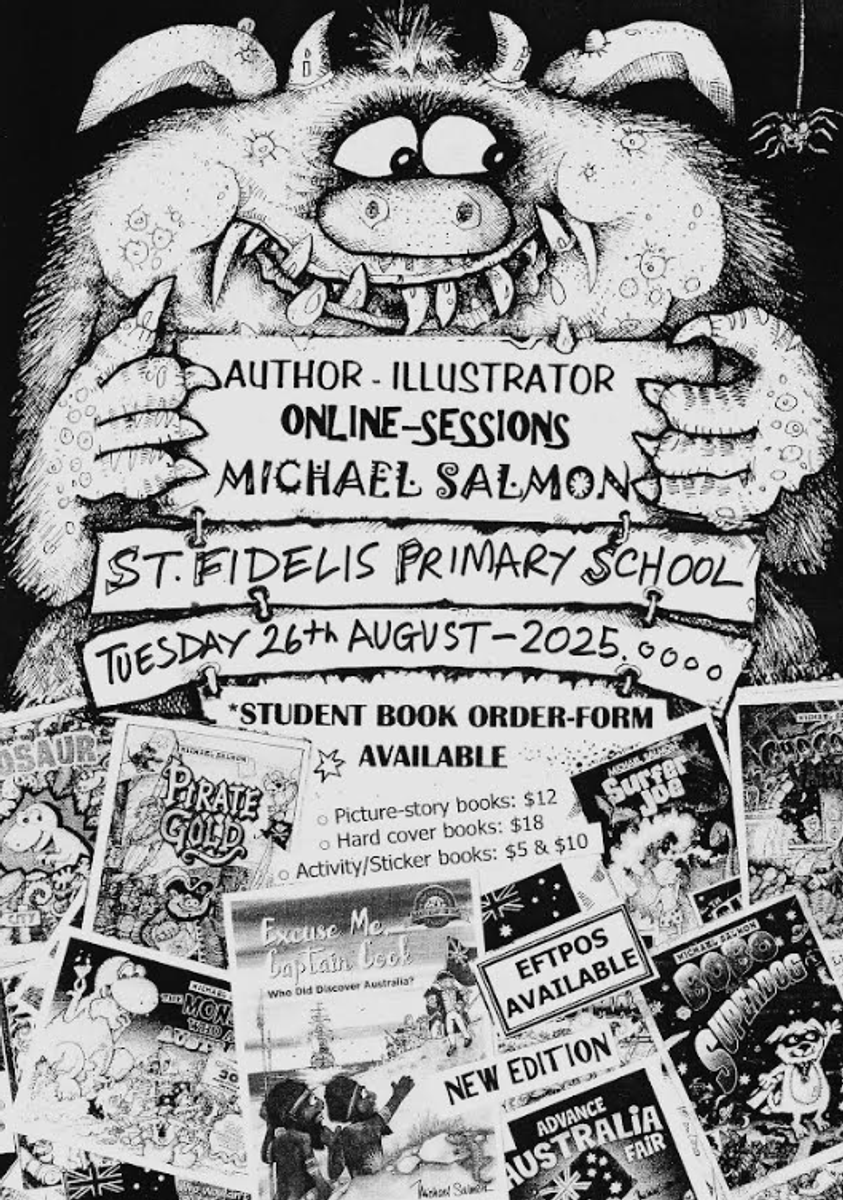

About Michael Salmon
Michael Salmon is an Australian author and illustrator who has been creating children’s books for over 50 years. He’s best known for the character Alexander Bunyip, from the book The Monster That Ate Canberra and the ABC TV show. Michael has written and illustrated more than 160 books, and his stories are loved by kids all around Australia. Some of his books include:
Book Week Parade – Friday, 29th August at 9:00 AM
Have a great week.
Bernadette Parnis
bparnis@sfmoreland.catholic.edu.au
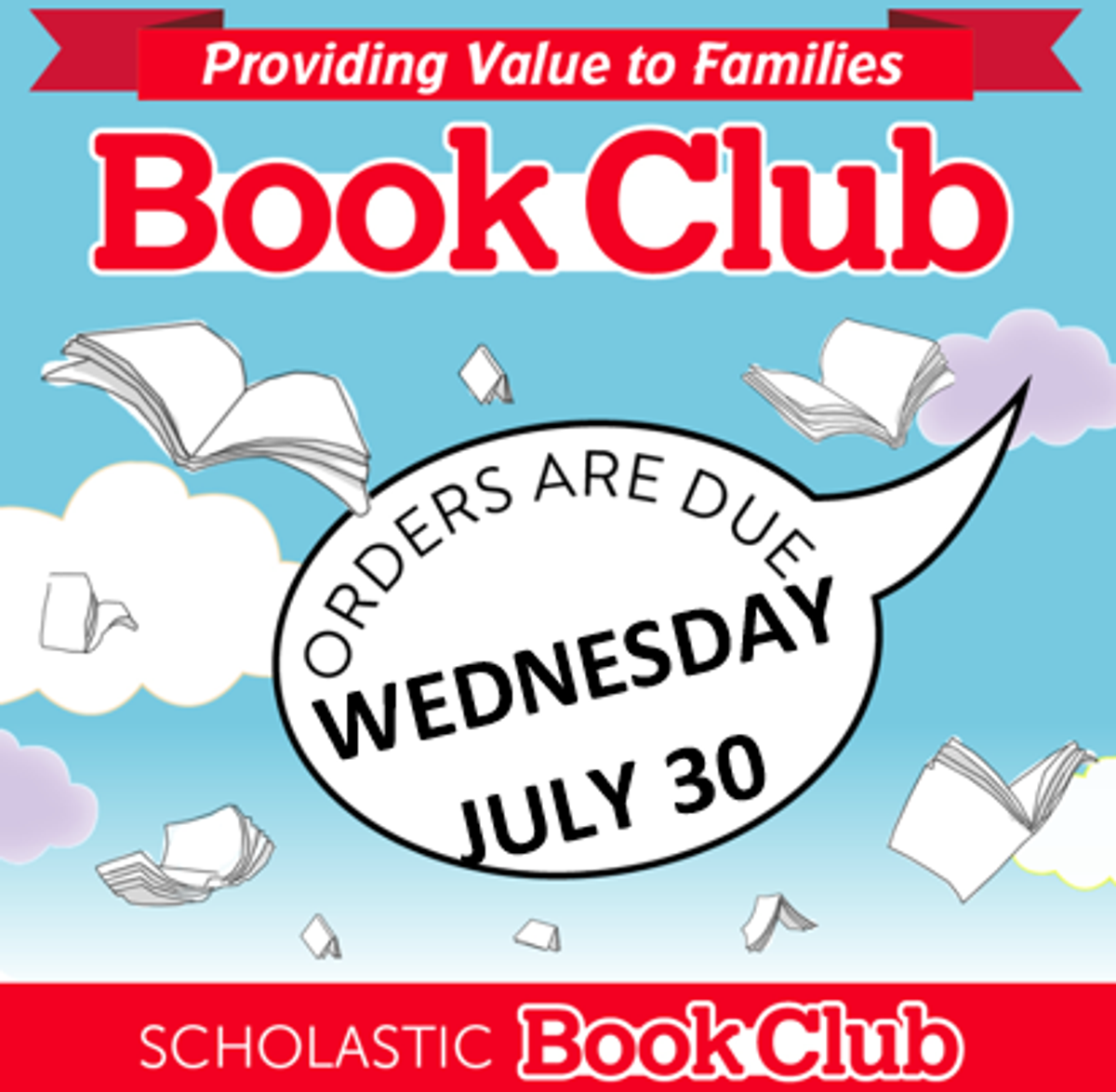
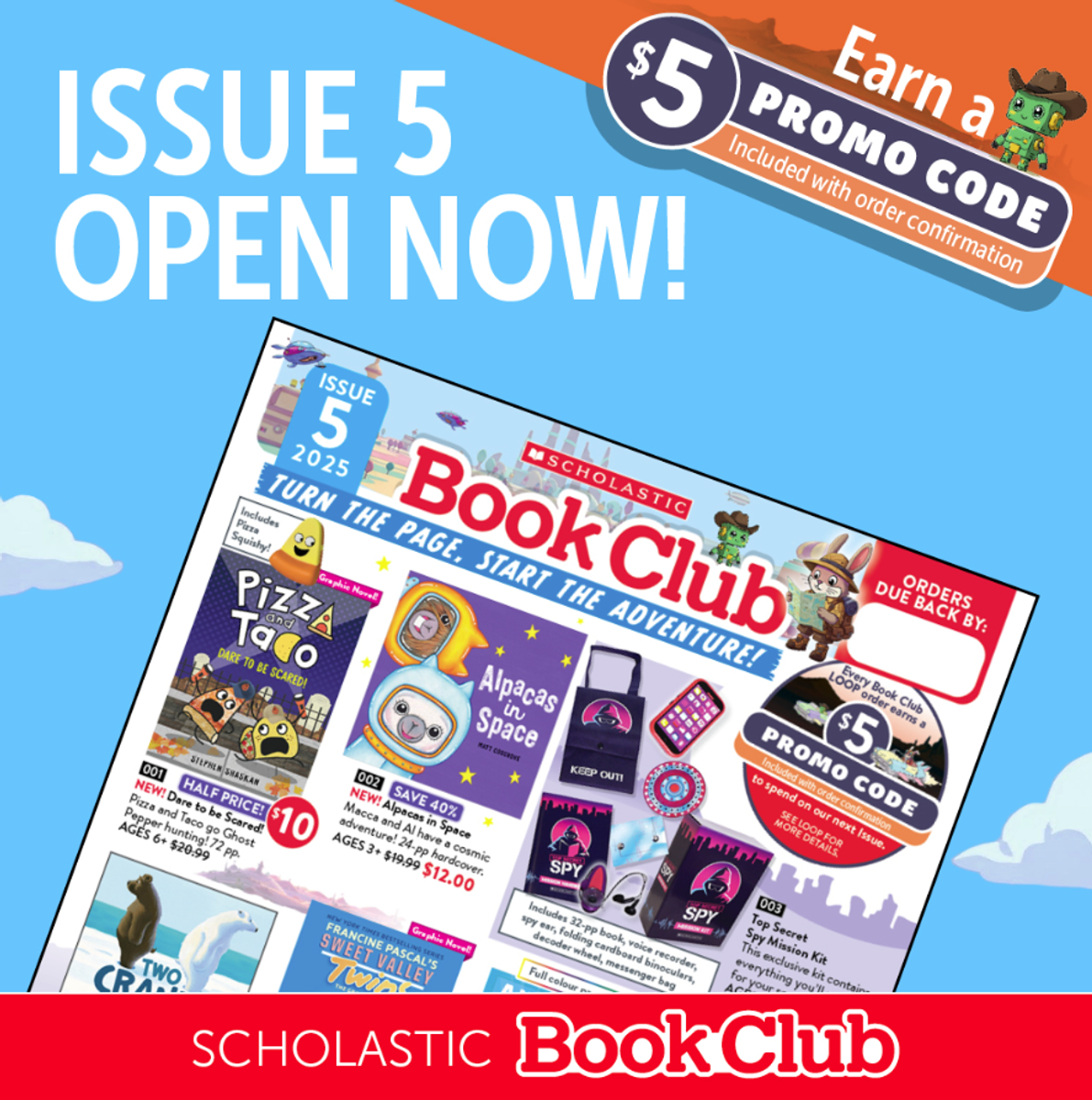


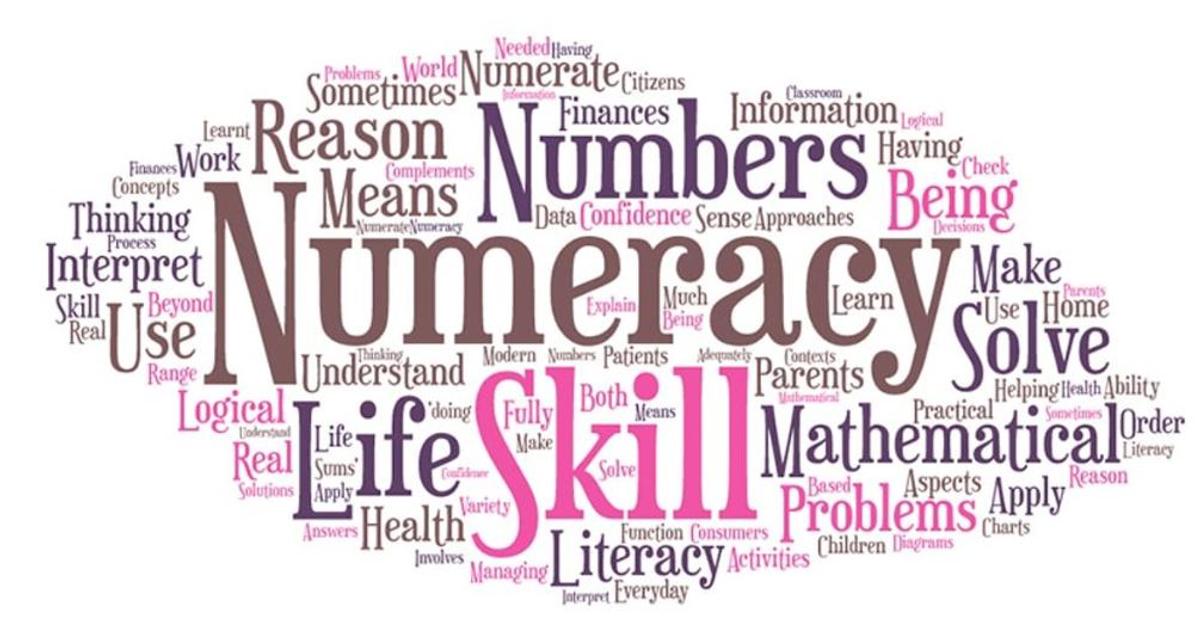

Welcome back to Term 3. We hope you all had a great break and are ready for the term ahead.
It was wonderful to see so many parents attending our recent sessions on supporting your child with addition and subtraction in Foundation to Year 2. Your enthusiastic participation highlights the strong partnership between home and school, and we truly value your commitment to helping your child thrive in their learning journey.
I came across this recently and thought this link and article may be worthwhile for you as well.
By Ann Gervasoni and James Russo
Posted 14 Feb 202314 Feb 2023, updated 31 May 202431 May 2024
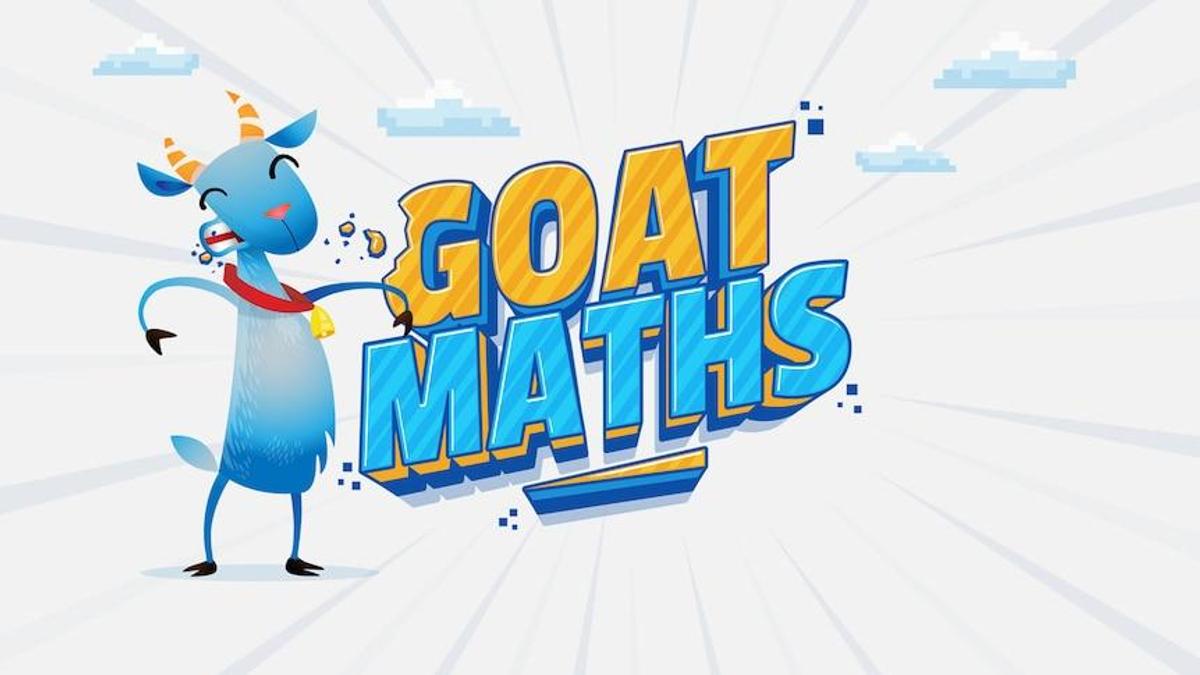

The GOAT Maths games are a fun collection of teaching tools designed to engage students and help teach important maths concepts. (ABC Education)
Share
ABC Education has a new, fun and exciting way for primary students to practise and extend their mathematical thinking and skills. The GOAT Maths games are perfect for teacher-guided group play, allowing students to play as a class or in small groups as they explore and discuss the maths and the antics of loveable goats.
What is your greatest of all time (GOAT) mathematics moment? It might have happened at school, but it's more likely to be a moment in your everyday life or at work. Mathematics is for living!
Many people don't notice how much maths is a part of their everyday life and work.
What about you? We wonder what draws you into doing and learning mathematics. Is it budgeting and managing your finances? Is it playing a game or planning a road trip? Perhaps it's the need to modify a recipe or measure ingredients.
Maybe you love the challenge of solving a problem, organising data or finding an underlying pattern.
We need maths for life.
Teachers are very aware that students will use and learn mathematics throughout their lives.
However, the complexity of life and global issues in the 21st century means that using mathematics creatively to understand and solve problems, as well as to communicate and discuss ideas, is now an essential part of life, work, and citizenship.
More than ever, mathematics education must enable all students to flourish with mathematics learning, and be confident, thoughtful users of mathematics.
Create dynamic maths classrooms.
Learning mathematics concepts and strategies is an active process that takes time.
For children, learning involves moving, touching, seeing, hearing, noticing, thinking, imagining, describing, discussing, representing, investigating and reflecting.
GOAT Maths games
ABC Education's GOAT Maths games are a fun collection of teaching tools designed to engage students and help teach important mathematics concepts.
The antics of the goats in GOAT Maths provide contexts to promote engagement, problem-solving and learning.
There are two types of interactives: launch activities and games.
The launch activities focus on key mathematics concepts or strategies, e.g. estimation, doubles facts or recognising combinations for ten. Launch activities assist students to notice and discuss mathematical properties, and they help students apply their learning to solve problems.
The interactive games provide opportunities for students to practise and extend their mathematical thinking and skills, such as mental computation. The games provide contexts for teachers to lead discussions and investigations about the mathematics that students notice and use, and they assist students to describe patterns, rules and generalisations.
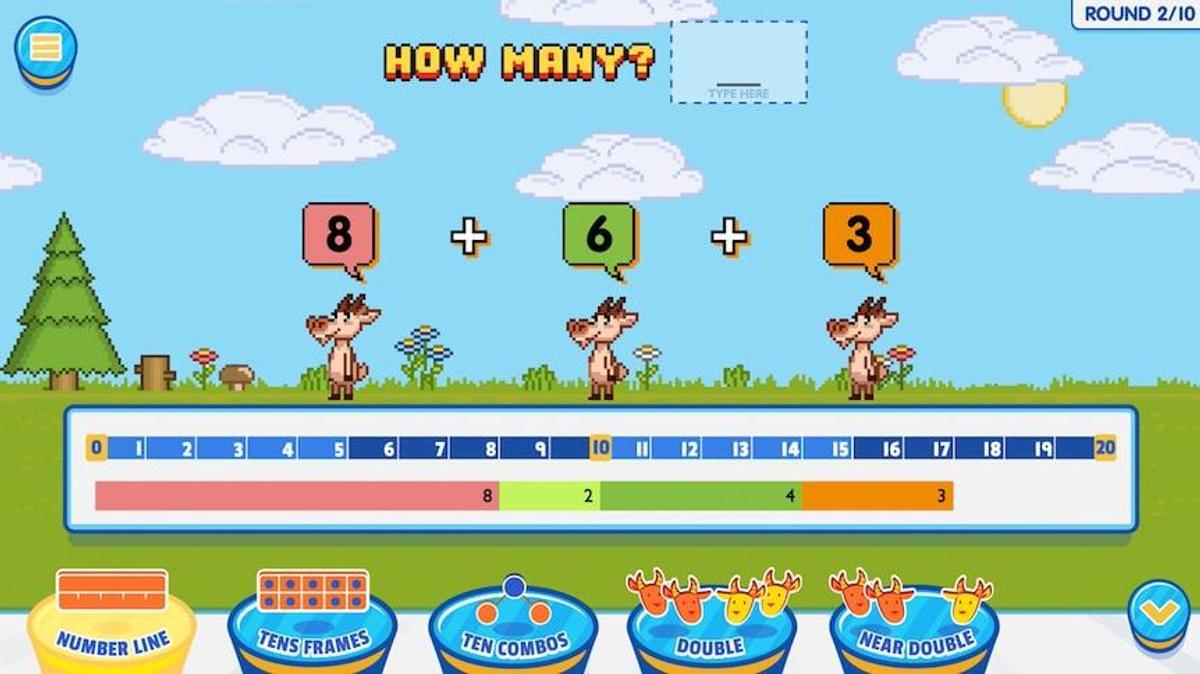

It's raining goats, and students need to use their knowledge of different strategies (e.g. combinations for ten) to work out the totals as efficiently as possible.(ThunderGoats, ABC Education)
Group play, collaboration and teaching
An important feature of the GOAT Maths interactive games is that they promote collaborative group play.
Play and collaboration are key features of effective learning environments for mathematics.
The interactives can be projected onto a whiteboard or screen, enabling everyone in the class to participate. They also work well for small groups or families using a single device, or for individual students working remotely.
For example, the games provide a great context to practise calculation strategies to deepen students' thinking.
The GOAT Maths games require choice and strategy for players. This means teachers should actively seek the advice and opinions of students about game play, and about their mathematical thinking and reasoning. Students are to be encouraged to talk about their ideas in pairs and small groups as they play a game.
For all the GOAT Maths games, the teacher/ parent needs to play an active role in assisting students to notice the embedded mathematics concepts and strategies, and to talk about these ideas.
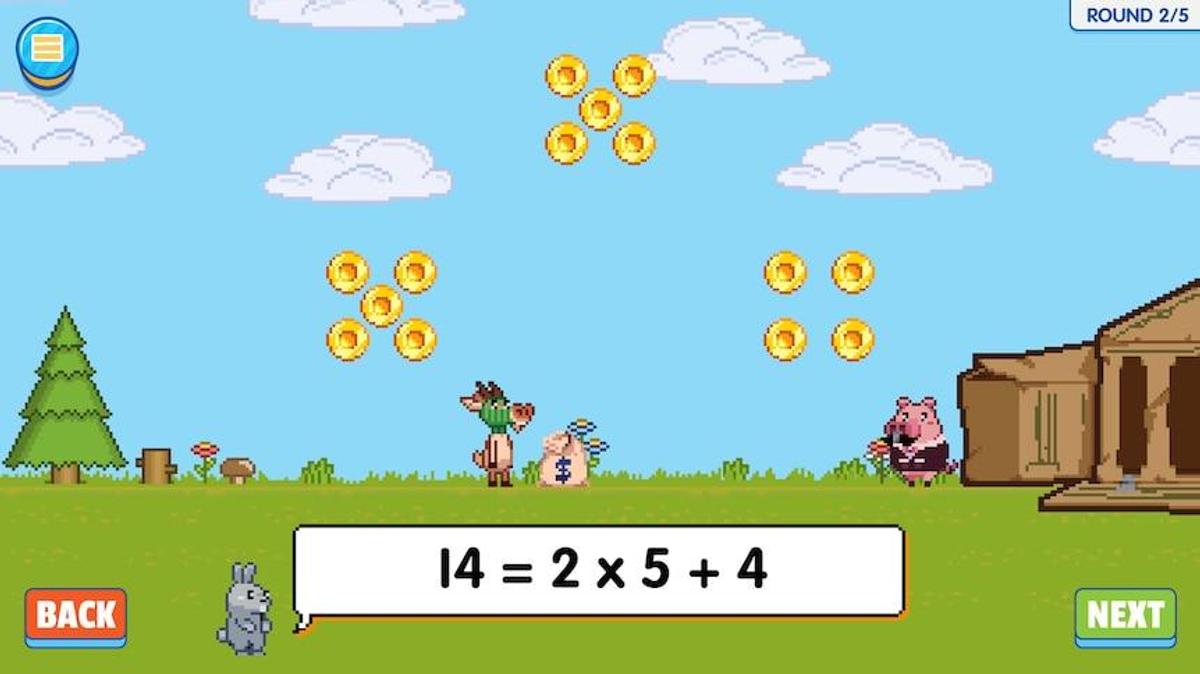

Burglars have robbed the piggy bank. As a team, students must use subitising to estimate the size of the heist, and then use number sentences to explain their thinking.(Greatest Of All Thieves, ABC Education)
Mathematical representations support learning and investigations
The GOAT Maths games and launch activities use a range of visual and numerical representations that are designed to help teachers facilitate inclusion, thinking and discussion for all students.
The GOAT Maths activities can be complemented through students using concrete materials or drawings alongside the digital representations.
For example, in Greatest of All Thieves students can "join" the goats to organise collections of coins and tokens into arrays to make calculating totals more efficient, or they can create alternative possibilities for discussion.
Using the GOAT Maths interactives and games will inspire students and teachers to pose new questions and problems to solve. We anticipate GOAT Maths will lead to many interesting mathematical investigations for students, teachers and families.
Mathematics is for life!
Visit ABC Education to play the GOAT Maths games.
BUONGIORNO!
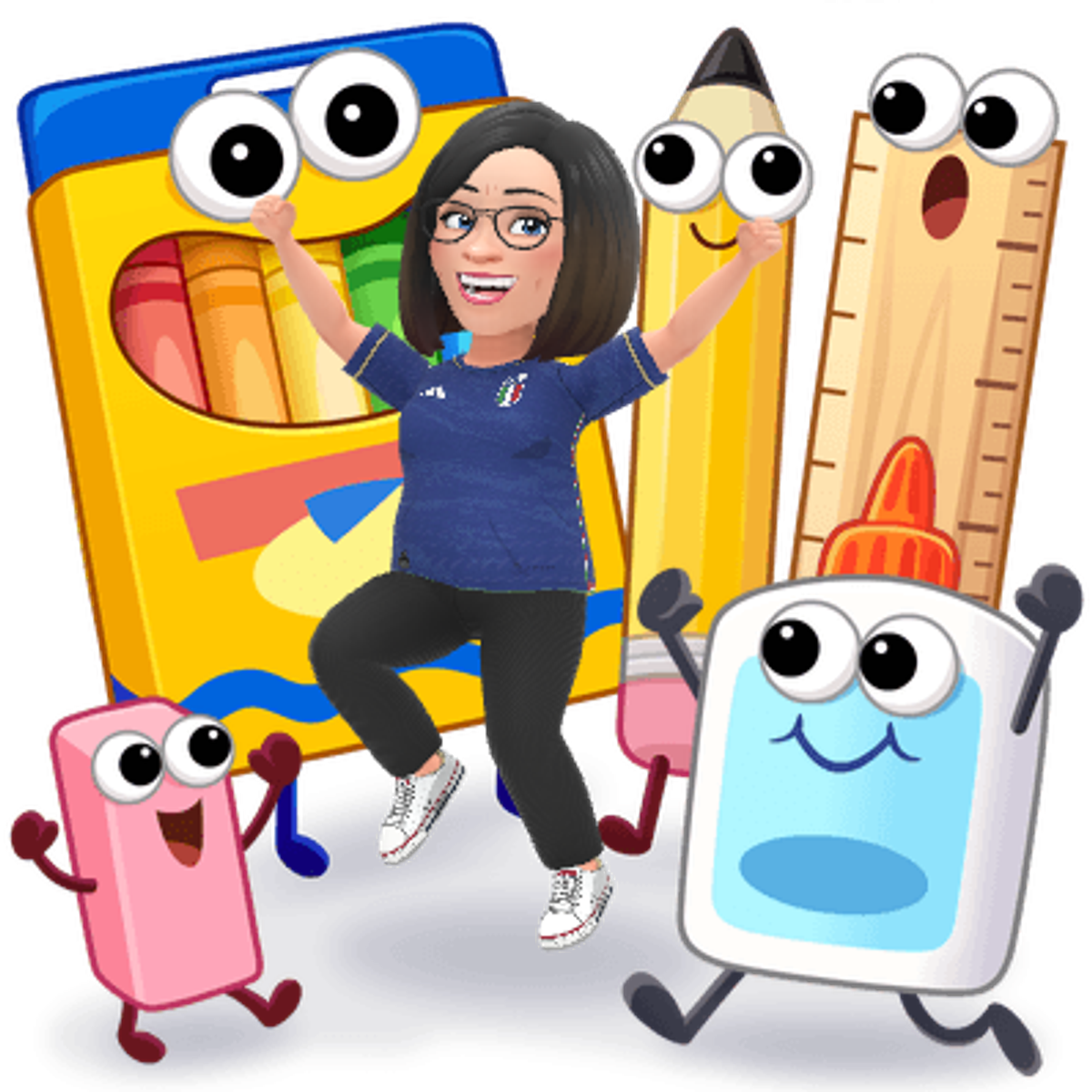

Bentornati a tutti per il terzo trimestre!
(Welcome back everyone for the third term!).
I hope everyone had a lovely vacanze, (holiday break), riposando (resting), giocando con amici e famiglia (playing with friends and family), maybe even going to il cinema or il parco…when it wasn’t troppo freddo (too cold).




Firstly, I would like to take this opportunity to say auguri a tutti i nonni nella nostra comunità di St Fidelis, (well wishes to all the grandparents in our St Fidelis community). Venerdì scorso, (last Friday), as you all already know, our school had a messa (mass), nella chiesa (in the church), followed by activities nell’aula (in the classroom), with either nonno (grandpa), nonna (grandma), or both nonni, or even special older family members. It’s lovely to have a special day acknowledging our nonni and thanking them for all they have done and continue to do for us. As I always say to the children, without our nonni, we would not be here! 😍
Unfortunately, I don't teach on Fridays at St Fidelis, so I missed seeing all the happy faces from both the nonni e nipoti (grandparents and grandchildren), but I did get to see some of the fotografie (photographs) taken of the day. I was molto contenta (very happy), seeing tanti nonni (many grandparents), wearing their special nonni ribbons made earlier last week during our F-2 Italian sessions, as well as some of the older children giving their grandparents un biglietto per la Festa dei Nonni. Bravissimi bambini! ♥️♥️
Secondly, I’d just like to let you know that this term, even though it will be a shorter one than last term, only nove settimane, (9 weeks, it will be a jam-packed fun one for everyone. I will be focusing on the following topics:
Foundation: Il corpo, (the body), and i cinque sensi (the five senses)
Grade 1/2: Il cibo, (food) likes and dislikes
Grade 3/4: Colazione, pranzo e cena, (different meal times), plus food vocabulary
Grade 5/6: Pasta: history, timeline, types, and recipes
Further details will be in the upcoming term’s newsletters. 😃
Until next time, stay warm e buona settimana! (have a good week).
Signora Rosa 🌹